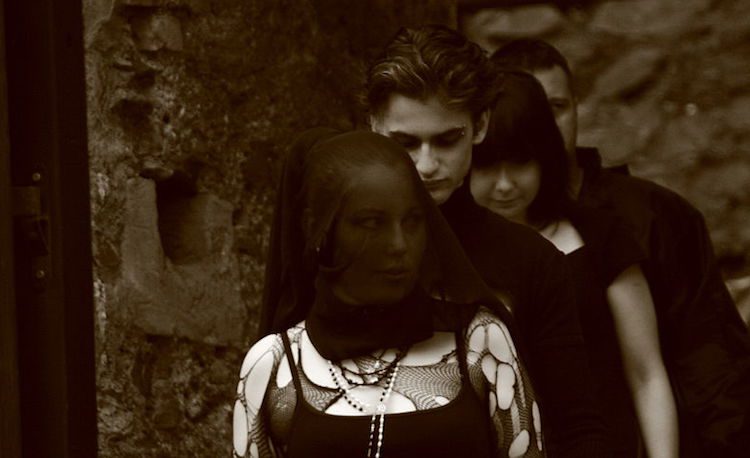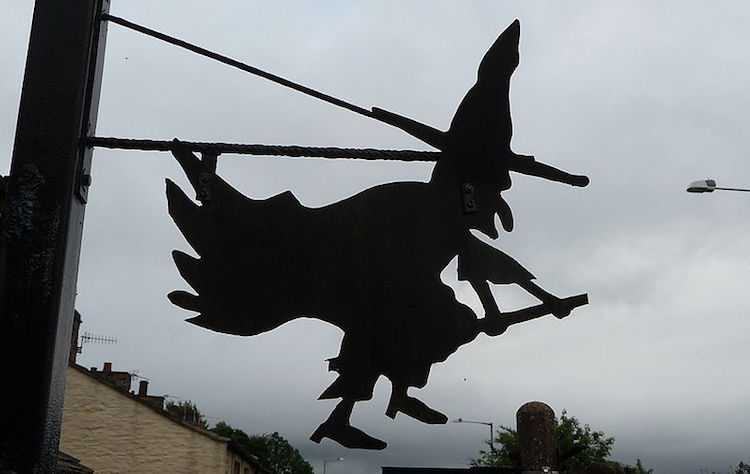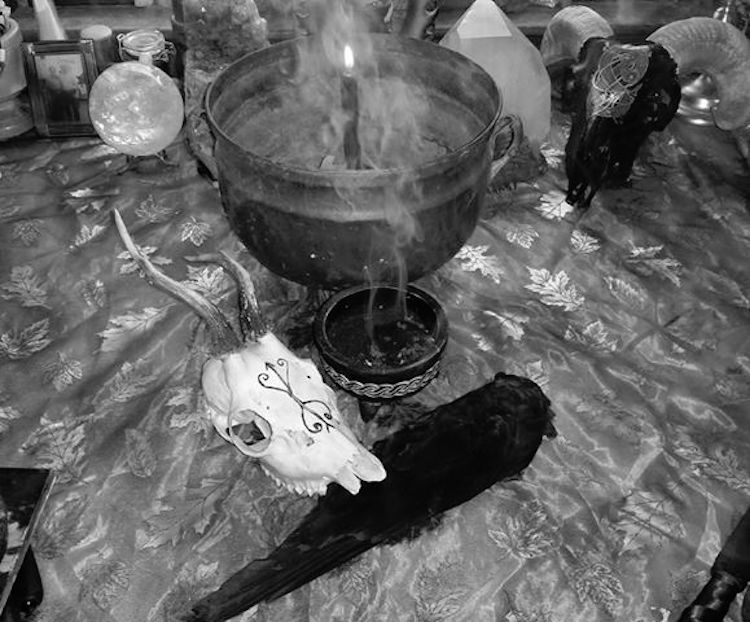Recently* I’ve been thinking about stereotypes and the way that preconceived notions and expectations shape our larger community, and I’ve also been thinking a lot about acceptability politics, that is the idea that a minority group needs to make itself as acceptable as possible to the majority or mainstream in order to succeed in any sense. While I do understand both the motivation behind acceptability politics and also the desire that many people have to feel accepted by the mainstream despite following a minority religion, I have never myself been the sort of person who easily slipped into the mainstream. Maybe that gives me a different perspective.

I’ve been contemplating the way that one of the main ‘jokes’ about traditional witches is that they are soooo dark and into skulls which often isn’t untrue but also hits at the goth aesthetic pretty hard. And the way that people automatically play off goth-looking witches as posers or newbies, as if only people trying too hard or brand new to witchcraft would dress all in black. On the surface it often seems funny, a way to make a joke of people who seem to fit a stereotype of what a witch dresses like. When you dig into it though I think it’s really just acceptability politics in action, its the group trying to dictate a certain wholesome and acceptable appearance for its members out of fear that those who aren’t overtly friendly and safe looking will be judged by the mainstream as dangerous and reflect badly on the entire group. Basically, if you look like everyone else then you are like everyone else and people can see you are safe, but if you dress like the stereotypical witch then maybe you aren’t so safe (no matter how nice you might really be).
Here’s the thing though, for me anyway, how a person dresses shouldn’t be a measure of how well or poorly they fit into a spirituality. And I think we all need to be cautious about assuming that a person’s appearance fits into our own preconceived notions in any way. It can also be an incorrect assumption to think that a witch who wears all black is doing so for any sort of spiritual reasons, as opposed to purely aesthetic ones. People have a lot of motivations for dressing the way they choose to. Quite frankly even if a person is playing to a stereotype on purpose, whatever their reasons, I don’t think it makes any difference to their spirituality; what we wear may reflect our personality but it isn’t a measure of how spiritual we are or aren’t.

I’ve been thinking so much about this because it’s an issue that hits home for me. I am Goth and I am witch. I have been witch for a few years longer than I’ve been Goth*, and one has nothing directly to do with the other, but both are important aspects of my life. Both are part of who I am. However I have over the decades run into varying degrees of acceptance and pushback within paganism for being Goth:
– I have been told, years ago, by someone I respected very much at the time that I need to stop dressing like a stereotypical witch because it made all witches look less respectable.
– I have been told that people like me are why others don’t want to call themselves pagan.
– I have been told that when I get a bit more experience or have been pagan for longer** I’ll outgrow wanting to wear black
– I have been told that it’s sad that I want attention so bad I’m willing to play into the stereotype.
– I have been told that no one will take me seriously as long I keep dressing Goth.
– I have been told that I must be a Satanist, not a pagan, or I wouldn’t dress that way.
– I have been told that I don’t take my religion seriously because of the way I dress
– I have been told that witches like me are considered a joke and are the reason that the mainstream thinks our religion comes from D&D
There seems to be an assumption that if you are Goth and pagan you must be a newbie, and seeking attention, and not very serious, and confused, and melodramatic. Goth witches are rarely taken seriously in my experience and are very often criticized, even publicly shamed, for their perceived insincerity, youth, inexperience, and negative reflection on the rest of pagandom. In fairness this has eased up somewhat in recent years, but nonetheless I can still think of several recent times I’ve seen memes or blogs making fun of one type of witch or other by playing on the intrinsic idea that witches who wear black, love the macabre, and like skulls are the punchline of a joke.
Let’s be clear here. Goth is a subculture based in a variety of things including fashion, music and a certain macabre aesthetic. It reflects what I like and what I am comfortable with. Witchcraft is a magical practice and spiritual system I follow. It reflects a certain worldview, cosmology and core set of beliefs taht are important to my life. The two, subculture and spirituality, are not at odds and I have found they go well enough together in my life. Why my fashion choices and taste in music bother some of my coreligionists so much kind of baffles me, but I think it’s only fair if I can accept witches who like Country music and denim, or Pop music and tube tops, then my personal tastes can be accepted or at least ignored.

I’m proud of who I am, and I think I shouldn’t be judged on my appearance, anymore than anyone else should be. I also think that the idea of witches being accepted by the mainstream if we all just dress and act like the mainstream is a dangerous myth. Not only does it encourage us to try to enforce homogeneity within witchcraft which destroys our beautiful diversity, but it sells us a false hope that if only we act normal enough we can be treated just like the religious majority. Not because we have equal rights, not because we deserve equal treatment, but because we fit in so well that they like us enough to give us what we deserve. Think about that for a minute. Really think about it – do you want equal treatment because it’s owed to you, or because the powerful people decide they feel like doling it out like a table scrap?
Sometimes generalizing is necessary, but it’s worth considering that if you don’t personally belong to a subculture it may be unwise to think you can pass judgment on that subculture. Many of the hurtful things that I see being said are rooted in ignorance and misunderstandings that could be avoided with a bit of open-mindedness and a willingness to listen. It is also worth keeping in mind that sometimes the person who most looks like you expect a certain “type” of person to look may in fact be the least like your expectation. Acceptability politics and gatekeeping are not doing witchcraft any favors, in my opinion, and they creating even more fractures and ill-will in the wider community which is something we do not need. I strongly believe that rather than trying to get the mainstream to accept us for something we aren’t – i.e. just like them* – we should work on accepting each other more for what and who we are.
Some people identify as witches but they have the Samantha from Bewitched mindset about it, they focus on wanting to be the suburban mom who goes unnoticed by her neighbours, and that’s perfectly fine. There’s nothing wrong with wanting to fit in. But there’s nothing wrong with fitting into a subculture that isn’t mainstream America either. Those with an approach to witchcraft that’s more like Morticia from the Addams Family are often pressured, subtly or overtly to “grow up” and remember that they are representing their co-religionists (paraphrasing actual things I’ve been told) and to conform for the greater good. But just like it’s fine to be Samantha it is or should be fine to be Morticia as well.
And maybe that is something the community at large needs to do some reflecting about.
*this blog originally appeared in part on my personal blog in 2015 and is being re-posted and expanded on here
*as I’ve mentioned elsewhere I’ve been pagan since about 1991; I’ve been Goth since the mid-90’s.
*practicing magic by its nature makes us not like the mainstream, just like being pagan makes us not like the Christian majority.


















